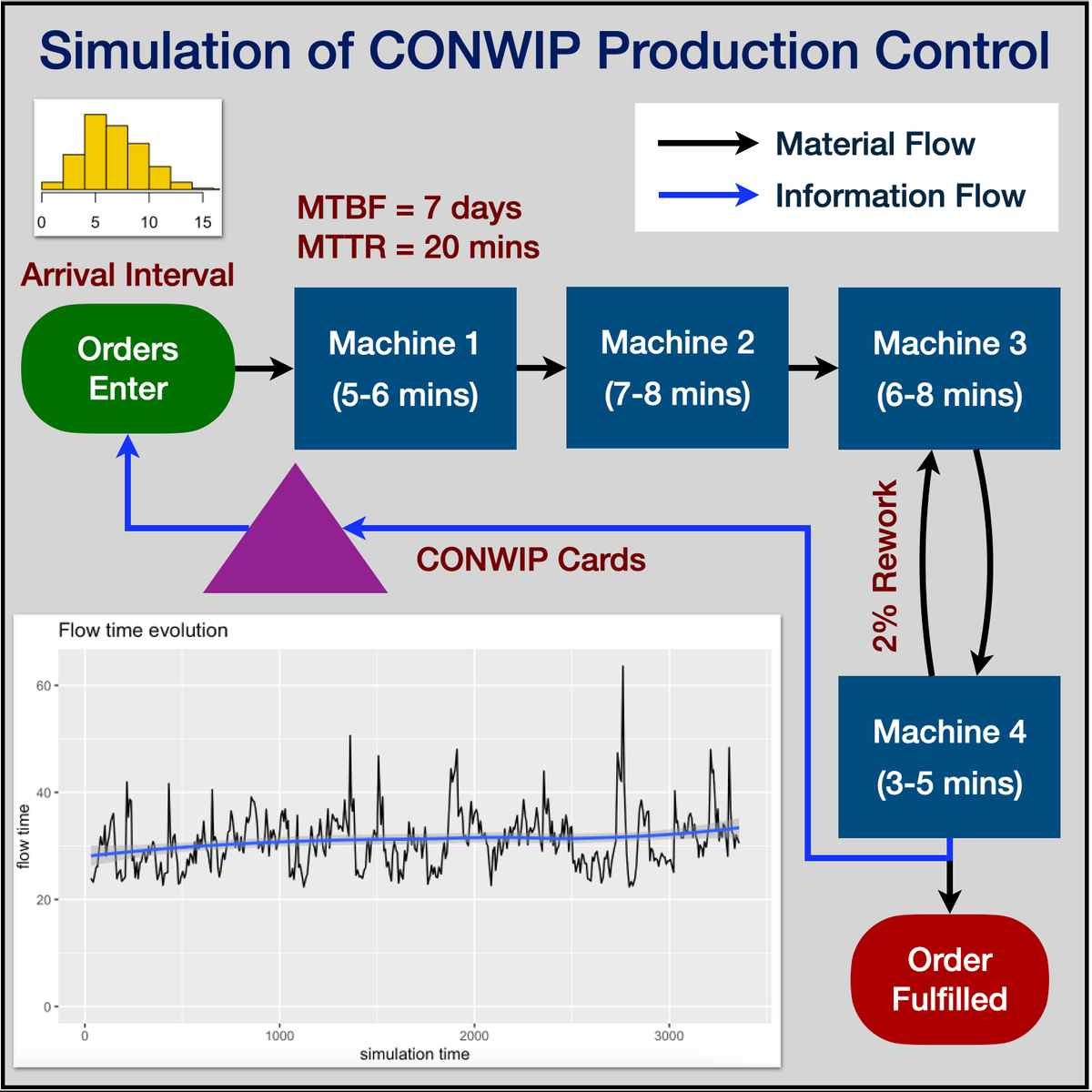
By the end of this project, you will learn gain introductiory knowledge of Discrete Event Simulation, use R Studio and Simmer library, create statistical variables required for simulation, define process trajectory, define and assign resources, define arrivals (eg. incoming customers / work units), run simulation in R, store results in data frames, plot charts and interpret the results.
What's inside
Syllabus
Good to know
Save this course
Activities
Organize Course Materials
Show steps
Organize your notes, assignments, and resources for easy access and review.
Show steps
-
Create a system for categorizing and filing your materials.
-
Use digital tools or physical folders to keep track of your work.
-
Review your materials regularly to improve retention and understanding.
Review 'Discrete-Event Simulation: Theory and Applications'
Show steps
Review a comprehensive text on DES to build a solid theoretical foundation.
View
Discrete-Event System Simulation
on Amazon
Show steps
-
Read the chapters on DES concepts, modeling techniques, and analysis methods.
-
Solve the practice problems and case studies to reinforce your understanding.
Simulate with Simmer functions
Show steps
Practice simulating with Simmer functions to strengthen your understanding of DES and R coding.
Browse courses on
Simmer Library
Show steps
-
Create a simulation model in R using the Simmer library.
-
Define the simulation parameters, such as the arrival rate, service time, and number of servers.
-
Run the simulation and collect the results.
-
Analyze the results and draw conclusions.
Two other activities
Expand to see all activities and additional details
Show all five activities
Explore Simmer Tutorials and Documentation
Show steps
Enhance your skills in using Simmer by following guided tutorials and exploring the documentation.
Browse courses on
Simmer Library
Show steps
-
Access the Simmer documentation and tutorials.
-
Follow the tutorials to learn about different features and functionalities of Simmer.
-
Refer to the documentation for detailed explanations and examples.
Develop a DES Model for a Real-World Problem
Show steps
Apply your DES skills to solve a real-world problem and create a comprehensive model.
Show steps
-
Identify a suitable problem for DES modeling.
-
Collect data and determine the appropriate model parameters.
-
Build the DES model using Simmer.
-
Analyze the results and draw conclusions.
Organize Course Materials
Show steps
Organize your notes, assignments, and resources for easy access and review.
Show steps
- Create a system for categorizing and filing your materials.
- Use digital tools or physical folders to keep track of your work.
- Review your materials regularly to improve retention and understanding.
Review 'Discrete-Event Simulation: Theory and Applications'
Show steps
Review a comprehensive text on DES to build a solid theoretical foundation.
View
Discrete-Event System Simulation
on Amazon
Show steps
- Read the chapters on DES concepts, modeling techniques, and analysis methods.
- Solve the practice problems and case studies to reinforce your understanding.
Simulate with Simmer functions
Show steps
Practice simulating with Simmer functions to strengthen your understanding of DES and R coding.
Browse courses on
Simmer Library
Show steps
- Create a simulation model in R using the Simmer library.
- Define the simulation parameters, such as the arrival rate, service time, and number of servers.
- Run the simulation and collect the results.
- Analyze the results and draw conclusions.
Explore Simmer Tutorials and Documentation
Show steps
Enhance your skills in using Simmer by following guided tutorials and exploring the documentation.
Browse courses on
Simmer Library
Show steps
- Access the Simmer documentation and tutorials.
- Follow the tutorials to learn about different features and functionalities of Simmer.
- Refer to the documentation for detailed explanations and examples.
Develop a DES Model for a Real-World Problem
Show steps
Apply your DES skills to solve a real-world problem and create a comprehensive model.
Show steps
- Identify a suitable problem for DES modeling.
- Collect data and determine the appropriate model parameters.
- Build the DES model using Simmer.
- Analyze the results and draw conclusions.
Career center
Simulation Engineer
Industrial Engineer
Process Engineer
Operations Research Analyst
Systems Analyst
Manufacturing Engineer
Operations Manager
Data Scientist
Data Analyst
Supply Chain Manager
Business Analyst
Software Engineer
Management Consultant
Project Manager
Financial Analyst
Reading list
Share
Similar courses
OpenCourser helps millions of learners each year. People visit us to learn workspace skills, ace their exams, and nurture their curiosity.
Our extensive catalog contains over 50,000 courses and twice as many books. Browse by search, by topic, or even by career interests. We'll match you to the right resources quickly.
Find this site helpful? Tell a friend about us.
We're supported by our community of learners. When you purchase or subscribe to courses and programs or purchase books, we may earn a commission from our partners.
Your purchases help us maintain our catalog and keep our servers humming without ads.
Thank you for supporting OpenCourser.



